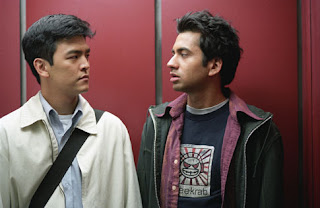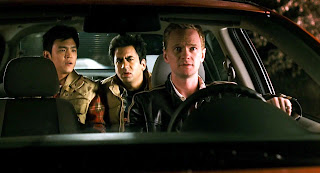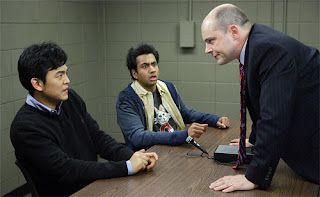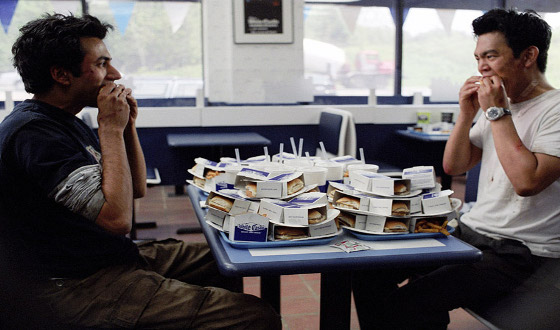Like, I saw Pineapple Express so many times my roommate wanted to murder me. We would watch Dude Where's My Car and mouth the lines along with the characters. And of course I saw Harold and Kumar 2: Escape from Guantanamo Bay* in theaters, even staying for the cut scene after the credits where Neil Patrick Harris comes back from the dead to lech another day. What I'm saying is that, despite all expectations, there was a period in my life where, for whatever reason, movies about mid-20s men getting stoned and going on weird adventures really spoke to me. I try not to read too much into it.
But I think it's a good way to go into our topic today because, in a lot of ways, the reasons that I enjoyed stoner comedies in my late teens and early twenties are the same reasons why those characters enjoyed getting stoned in their late teens and early twenties. Particularly in the case of Harold and Kumar, I felt like out of all the characters, I most understood those two guys. I liked them. I felt for them. I got them.
Now, in retrospect, most of the movies that one could call "stoner comedies" are pretty awful when you watch them as an adult. Even the Harold and Kumar films, much as I remember loving them, have regressive and insulting depictions of women, deeply offensive moments, and a general tone that I no longer enjoy. But for all of this, for all that I really don't like these movies as much any more, I have to give them credit for one specific thing: their complete and utter decimation of Asian-American stereotypes.
So that's what we're going to focus on today.
As you may well know, May is Asian-American and Pacific Islanders Heritage Month**, so, as we did for Black History Month and Arab-American Heritage Month, we're going to take this month to more deeply examine the stereotypes and tropes and issues involved in the way that Asian-American characters and stories are represented in our pop culture. And I want to start that off by talking about two guys who looked at all the stereotypes about what it means to be Asian in a Hollywood movie and then just pissed all over them. In the best possible way. So let's talk about Harold and Kumar.
If you're not familiar, here's the basic gist of the franchise's first movie, Harold and Kumar Go to White Castle - the sequels are fun but their plots are generally labyrinthine in their complexity, so we're not getting into it. The first film, which came out in 2004, stars John Cho as Harold Lee and Kal Penn as Kumar Patel, two young, potentially high-achieving Asian-American men who have responded to the stress in their lives and the pressure to perform by just getting super stoned all the time.
And if you want to be really technical, that's pretty much the story of the movie. I mean, the actual plot follows Harold and Kumar as they go on an epic road trip throughout New Jersey, desperately seeking a White Castle where they can get burgers and satisfy their munchies. Along they way they fall in and out of ridiculous situations, like crashing the car and getting picked up by terrifying hillbillies or picking up a hitchhiking Neil Patrick Harris (as a straight, psychotic version of himself) or riding a leopard. The movie is largely a string tying these wacky hijinks together and the real core of the film isn't so much their getting to White Castle, it's their relationships to each other and to themselves.
Those relationships are actually super interesting even if your taste doesn't run towards jokes about double penetration. See, Harold and Kumar both fulfill and then subvert our stereotypes about high-achieving Asian-American men. And in so doing, they reflect back at us the inherent unfairness of these stereotypes.
Harold works in an office, and to be totally honest it's not super clear what he does. What is clear is that Harold is the low man on the totem pole. We're introduced to him just as he's getting ready to leave for the weekend, but already one of his coworkers is stopping by to drop off more work.
Work that means that Harold will have to work pretty continuously through the weekend to finish in time for Monday. Why has this guy dumped it all on Harold? Explicitly because he's Asian and therefore must not have much of a life or any interests outside of work. No wonder all he wants is to leave and go get stoned with his best friend.
Kumar, on the other hand, is the kind of brilliant slacker we're super used to seeing white guys play. We meet him as he's in an interview for medical school, bedraggled and looking like he just got pulled through a hedge, openly telling the interviewer that he doesn't care about this and he doesn't want to be a doctor.
The interviewer is shocked - why wouldn't he want to go to medical school when he has near-perfect MCAT scores and is all set to go off into a prestigious career? Even more, his whole family is full of doctors and they're pressuring him to take this step and "start his future". But Kumar doesn't want that - he isn't interested in the stress and intensity of med school.*** So he blows it off and goes to get high with Harold.
On the surface, it feels like Harold is a more inherently sympathetic character than Kumar. I mean, he's put-upon at work but he's trying so hard. Kumar, though, isn't trying at all. He's in fact aggressively pushing away the great advantages he has and trying to avoid following the path that's been set out for him. But what works so well here is that both Harold and Kumar subvert our ideas of who Asian-Americans are supposed to be and what they're supposed to want. And Kumar's rejection of med school is just as sympathetic in a lot of ways as Harold's frustrations at work. Let's break it down.
I feel like I shouldn't have to tell you that there's a certain way Asian-Americans, particularly men, are portrayed in the media. Especially in comedies. They're invariably the butt of the joke, right? Like in that awful awful sitcom Dads, where Asian men and their "tiny dicks" were the punchline of the pilot episode. Aside from the tragically rare complex portrayals we get in shows like Fresh Off the Boat, Asian-American men are generally represented as being hardworking, socially incompetent, asexual/sexually unappealing, and weak. In other words, most of media portrays Asian-American men as "not real men". Asian-American masculinity is said like it's a joke.
Harold and Kumar faces that down by giving us two characters who have to live in this toxic landscape and somehow get through. Clearly they've taken very different life paths, but it's sort of ended up the same. They're both pissed off, which, again, isn't something we're used to from Asian-American characters.
The film goes after a number of these stereotypes, but the ones it hits the hardest are the ideas that Asian-American men are inherently hardworking and that they're uninterested in sex or sexually uninteresting. The movie then focuses its plot on demolishing these stereotypes and helping us to see Harold and Kumar as complex, fully-developed people (if occasionally not very nice people) rather than racist stereotypes.
As far as "hardworking" goes, obviously the film subverts that by giving us Kumar, a gifted slacker who has no interest in hard work and even scoffs at the idea of buckling down and using his big brain for anything useful. Like I said above, we've seen this character as a white guy, but it's hard to think of many other examples where he's Asian.
Additionally, the movie examines ideas about familial pressure and the immigrant experience. Kumar expresses his frustration with his parents for pushing him so hard towards medicine. There's this idea that as the child of immigrants, Kumar "owes it" to them and to himself to achieve as much as he can as fast as he can. Kumar, though, rejects this for the most part. He wants the chance to be just like any other guy in America, stoned if he wants to be and a failure if he so chooses.
When, at the end of the film, he decides to give med school a chance, it's not because he's giving in to the stereotypes and pressure, it's because he has been pushing it away for the wrong reasons. He's been pushing back because he doesn't want to be defined as yet another Indian guy going to med school, but the truth is that he really likes medicine and would enjoy it as a career.
The complexity of Kumar's issues with school and fears about his future bely the usual narrative about a high-achieving Asian-American student who just mindlessly goes off into the sciences or medicine like a "job-stealing" robot. Kumar is a person with hopes and fears, and by showing us the turmoil and hilarity of his decision process, the film humanizes him and people like him.
Harold, on the other hand, already seems like a perfect example of the usual pop culture depiction of an Asian-American man. Pushed around, "hardworking" whether he wants to be or not, and passive at work, Harold has a lot to get through. But his story is about pushing those stereotypes away from his own understanding of himself.
It's about Harold letting himself be more assertive, even if no one is ready for him to be. And because the movie makes it clear that Harold isn't so much naturally hardworking as he is shoved around by a culture that ignores his unique personhood, we the audience are forced to reckon with his humanity. He's not a stereotype of some Asian-American worker drone, he's a real guy who's annoyed that he has to work through the weekend.
And because he's pushed into the East Asian "submissive" box, seeing him verbally take down his coworker at the end of the film is really satisfying. It's not that Harold was always a pushover, it's that he was uncomfortably asserting himself in a work situation - again, showing the complexity of the issues at play forces us to think about his humanity and reconsider the people we see around us.
As far as the issues about Asian-American male sexuality go, there's this lingering racist belief that Asian men aren't good at sex or interested in it or, well, horny. And Harold and Kumar definitely puts that one to rest. While I don't love the aggressive sexuality of the film and the constant sexualization of female characters (who are generally little more than boobs and butts for the guys to lust after), I can understand the importance of reminding an audience that these two characters, these two Asian men, are sexual beings. They like sex. They think about it. They are actively pushing back against the idea of the sexless Asian man, and I can appreciate that.
There's more to look at in Harold and Kumar, but I'll leave it for another time. For now, let's take this as an entry into Asian-American and Pacific Islander Heritage Month - a reminder that Asian-American men and Asian-American masculinity is much more complex than the media has led us to believe. There is value in ascertaining our understanding of the stereotypes in play, because once we know what they are we can destroy them. And even though Harold and Kumar really is just a not-very-deep stoner comedy, by centering this story on two Asian-American men, it reminds us that they're human too.
Human, frustrated, and frequently stoned.
*There is definitely material worth considering in this movie - like, so much. So much. I think we're going to have to do a whole other article on the issues raised in Escape from Guantanamo Bay, from Kumar being mistaken for a terrorist to the whole idea of their position as men of color meaning they are vulnerable to government overreach... More on this later.
**So, there's a lack of consensus on whether or not the indigenous peoples of Oceania, a group that overlaps with Pacific Islanders, are counted as Asian-Americans or Native Americans. And since I am not at all the most qualified person to figure this out, I'm going to defer to smarter people than me on this one - we'll be talking about Native Hawaiians and the indigenous people of Oceania (like in Lilo and Stitch) in November for Native American Heritage Month. Heads up!
***This is of course kind of funny as Kal Penn later found some mainstream recognition playing a doctor on House MD. Also John Cho went on to play another office drone, albeit one with a much better career trajectory, on Selfie. These secondary roles are more stereotypical representations of Asian-American men than their work in Harold and Kumar, which is a bit of a bummer. But good characters in and of themselves.








So will there be any talk about Sulu from Star Trek given that his role at the time was one of the first to be non-stereotypical?
ReplyDeleteI hear you about Asian men in media. I always thought eastern Asians (Chinese, Korean, Japanese, etc.) were the most beautiful people in the world, so naturally I always had crushes on the Korean dude at school, the Taiwanese dude I met in the Air Force, Sulu, Ensign Kim (ST: Voyager), etc. I remember being so frustrated that the Asian men weren't portrayed as desirable at all - that's how I saw them and I was dying to live vicariously through some lucky actress on the screen.
ReplyDeleteOh well - it does seem to be changing, thankfully.
nice
ReplyDelete
ReplyDeletebest call girl in kolkata
kolkata sex girls number
sexy girl contact number
kolkata local call girls
call girl contact number kolkata
kolkata call girl area
college girls for sex in kolkata
call girl for sex in kolkata
kolkata call girl address
FEMALE CALL GIRLS KOLKATA
ReplyDeleteFEMALE CALL GIRLS
SEXY CALL GIRLS SERVICE IN KOLKATA
ESCORTS SERVICE IN KOLKATA
KOLKATA FEMALE ESCORT SERVICE
TOP ESCORTS SERVICE KOLKATA
BEST KOLKATA ESCORTS SERVICE
CALL GIRLS SERVICE
ESCORTS SERVICE
ESCORT SERVICE
ESCORTS SERVICE IN KOLKATA
BENGOLI ESCORTS GIRLS
BENGOLI CALL GIRLS KOLKATA
KOLKATA ESCORTS SERVICE
FREE ESCORTS SERVICE KOLKATA
FREE WHATSAAP NUMBER ESCORTS
FREE WHATSAAP NUMBER OF CALL GIRLS
PHONE NUMBER OF ESCORTS SERVICE
FREE PHONE NUMBER ESCORTS SERVICE
MOBILE NUMBER OF ESCORTS SERVICE